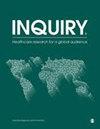加强临床研究人员的沟通和知识转化技能:来自 "好好呼吸 "小组的创新游戏模式
IF 1.7
4区 医学
Q3 HEALTH CARE SCIENCES & SERVICES
Inquiry-The Journal of Health Care Organization Provision and Financing
Pub Date : 2024-09-14
DOI:10.1177/00469580241273178
引用次数: 0
摘要
沟通是临床医生角色的核心组成部分;然而,当临床医生开展研究时,向不同类型的利益相关者传达新的研究结果和建议可能是一个陌生的领域。通过交流研究成果来倡导变革可能更具挑战性。希望成为变革推动者的临床研究人员需要构思和设计具体的、以证据为基础的信息,并将这些信息有效地传达给不同的利益相关者,以协商行动。作为全球健康研究计划的一部分,我们开发并测试了一种基于游戏的新模式,以加强来自 4 个国家的临床研究人员的沟通技能,从而改善慢性阻塞性肺病的服务。该模式重点关注与 3 个关键利益相关群体的沟通,以促进知识转化:患者/护理人员、医疗保健提供者和政策制定者/医疗保健管理者。该模式通过一系列在线会议进行,由两部分组成:在辅导支持下制定和演练宣传信息,然后与 3 个具有代表性的利益相关者小组和研究人员听众进行测试。所有国家团队都报告说,他们在为特定利益相关者制定宣传信息方面增强了信心,并从该模式中吸取了经验教训。在全球健康研究计划中实施这一模式需要指导、时间、承诺、资源和翻译支持,以解决语言障碍问题。它为培养临床医生和非临床医生研究人员的沟通技能提供了一个范例,使他们能够超越传播,将证据转化为政策和实践。本文章由计算机程序翻译,如有差异,请以英文原文为准。
Strengthening Clinician-Researchers’ Communication and Knowledge Translation Skills: An Innovative Game Model From the Breathe Well Group
Communication is a core component of a clinician’s role; however, when clinicians conduct research, communicating the emerging findings and recommendations to different types of stakeholders can be unfamiliar territory. Communicating research to advocate for change can be even more challenging. Clinician researchers seeking to be agents for change need to conceive and craft specific, evidence-based messages and communicate these effectively to different stakeholders to negotiate action. As part of a global health research program, we developed and tested a novel game-based model to strengthen the communication skills of clinician researchers, from 4 countries, for improving services for chronic obstructive pulmonary disease. This model focused on communication with 3 key stakeholder groups for knowledge translation: Patients/carers, healthcare providers and policy makers/healthcare managers. Delivered through a series of facilitated, online meetings, this model consisted of 2 parts: developing and rehearsing advocacy messages with coaching support, and then testing them with a panel of 3 representative stakeholders, and an audience of fellow researchers. All the country teams reported increased confidence in crafting advocacy messages for specific stakeholders and have applied lessons learned from the model. Delivering this model within a global health research program requires mentoring, time, commitment, resources and translation support to address language barriers. It offers an exemplar to build the communication skills of clinician and non-clinician researchers so that they can go beyond dissemination toward translation of evidence into policy and practice.
求助全文
通过发布文献求助,成功后即可免费获取论文全文。
去求助
来源期刊
CiteScore
2.50
自引率
0.00%
发文量
192
审稿时长
>12 weeks
期刊介绍:
INQUIRY is a peer-reviewed open access journal whose msision is to to improve health by sharing research spanning health care, including public health, health services, and health policy.

 求助内容:
求助内容: 应助结果提醒方式:
应助结果提醒方式:


